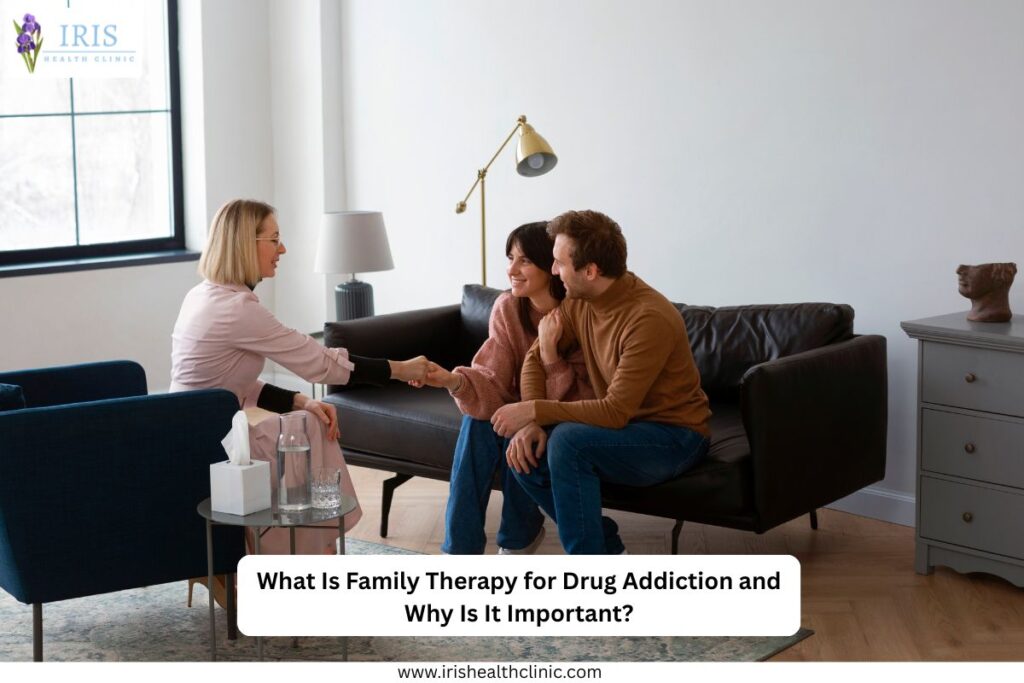At Iris Health Clinic we know that drug addiction impacts much more than just the individual struggling with substance use. It impacts the whole family. Broken trust, lack of communication, and emotional pain can make the recovery process difficult for the entire family. This is why family therapy is an important aspect to our addiction treatment approach. In this article, we will cover what family therapy for drug addiction is, its usefulness in recovering from addiction, and why family therapy is so important in order to ensure long-term recovery.
What Is Family Therapy for Drug Addiction?
Usually, Family Therapy for Addiction Treatment implies a somewhat specialized counseling concept that involves both the person in recovery and family members or others whom the individual considers family. Family therapy is often to build communication, rebuild trust, and explore those dynamics that may have set the stage for substance use.
Therapists make sessions for family members to identify issues, air feelings, describe experiences, and learn ways to continue to support one another in healthier ways. Family can mean parents, spouses, siblings, children, or any person seen as a member of the familiar unit.
Why Is Family Therapy Important in Addiction Recovery?
Your family is a healing entity, and family therapy for drug addiction is about healing as a family unit. Substance abuse disorders create cycles of blame, guilt, resentment, or enabling behaviours, which can go recognised and lead to a recovery journey.
Family therapy is important for several reasons:
- Addressing the Root Causes – Many substance abuse issues are symptomatic to family conflict, unresolved trauma, and unhealthy family dynamics.
- Reduced Relapse Risk – Knowledgeable and supportive families can help the person avoid relapse.
- Improved Communication – Listening, and responding without judgement – learning this skills helps strengthen relationships and family connectedness.
- Healing Emotional Wounds – A safe space is created to forgive and rebuild trust.
- Educating the Family – Families learn about addiction as a disease, signs of relapse, and how to establish healthy boundaries.

What types of therapy methods are used in family addiction counseling?
Family addiction therapy at Iris Health is based on evidence-supported forms of practice such as:
- Structural Family Therapy – Restructures dysfunctional family roles and boundaries.
- Functional Family Therapy – Enhances communication and problem solving.
- Cognitive Behavioral Therapy – Provides replacement of negative thought processes with positive thought processes.
- Multidimensional Family Therapy – Addresses external influences and focuses on family influences.
- Behavioral Couples Therapy – Fosters the relationship with partners in recovery.
- Psychoeducation- Teaches the facts about addiction (science) relapse prevention, and coping skills.
These strategies are blended to fit each family and create trust in the relationship, better communication, and promote recovery.
Are children involved in family therapy for addiction cases?
Yes — when appropriate — children can attend family therapy for addiction. Children can be included in a safe and age-appropriate way at Iris Health Clinic, allowing them to express what they feel, ask questions, and understand that addiction is not their fault. Therapists may go about helping the younger children process their feelings by using simple language, activities, and play techniques.

Including children in therapy is helpful for …
- Clearing away any misunderstandings or feelings of distress.
- Rebuilding trust and connection with the parent or loved one in recovery.
- Teaching healthy coping and resiliency skills from an early age.
Inclusion in the therapy process supports our overall objective, to ensure that every family member can get the help they need to heal, regardless of their age.
What mistakes should families avoid during therapy?
Though family therapy is a protective and healing place for families, some problematic behaviors can diminish progress. At Iris Health Clinic, we encourage families to be aware of these missteps:
- Blame and Shame – This leads to defensiveness and fails to evoke an open conversation.
- Overemphasis on the Past – It is good to talk about past events, but bringing up the unfixed past too often can jeopardize the healing process.
- Unexplored Honesty – Avoiding feelings or being overly positive will inhibit any chance of true change.
- Expecting Immediate Results – Change is a process; it takes time, and you need patience.
- Failing to Attend – Regular attendance builds trust and is necessary for sustained treatment deliverables.
With awareness of these pitfalls, families can create a blame free context for family therapy to be effective and recovery to feel available.
Is family therapy covered by most health insurance plans?
Often, yes – most insurance covers family therapy for addiction under mental health benefits. Coverage varies and it is best to check your policy to find out coverage requirements. At Iris Health Clinic we help families verify insurance and understand their options.
Take The First Step Toward Healing
If your family is coping with the consequences from a drug addiction, we want you to know that there is help – healing is possible.
📞 Call Iris Health Clinic today to find out how our family therapy services can help you regain trust, rebuild relationships and create a future without addiction.

